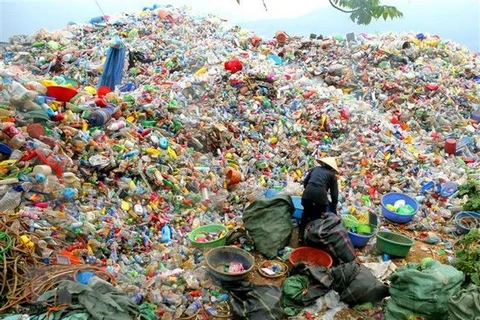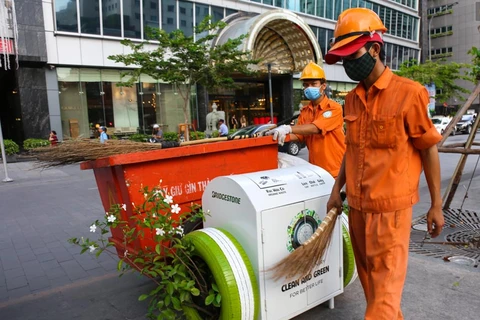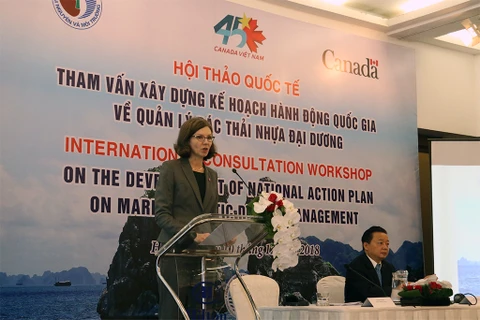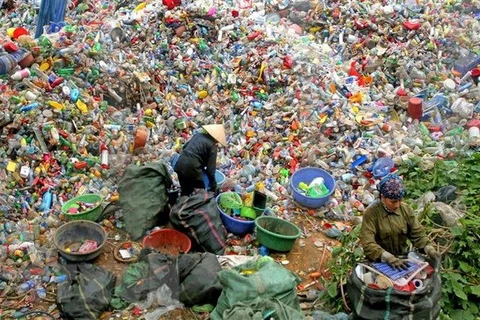 Plastic waste littered on the fishing port of Quynh Phuong in the central province of Nghe An (Photo: VNA)
Plastic waste littered on the fishing port of Quynh Phuong in the central province of Nghe An (Photo: VNA) Hanoi (VNS/VNA) - There are two key components needed to rid the oceans of plastic, a senior professor has warned.
Assoc. Prof. Nguyen Chu Hoi says the public need to cut down their usage and the authorities need to look into the collections and treatment of plastic waste in the sea.
Assoc. Prof. Hoi from the National University of Vietnam – Hanoi was speaking at the fourth edition of the international conference Ocean Dialogue, themed combating plastic pollution, held on January 16 in Hanoi by the Diplomatic Academy of Vietnam and the Australian Embassy.
The aim of the conference is to foster discussions and sharing of initiatives to manage plastic waste and boost regional cooperation.
“Cleaning up plastic debris in the sea is much more difficult compared to that on land, it requires investment into technologies such as floaters with specialised nets, which would be made easier with the collaboration between countries,” Hoi added.
Vietnam currently ranks 17th among the most heavily plastic-polluted countries in the world, with half a million of tonnes of plastic waste ending up in the oceans.
The country is part of the Southeast Asian region, comprising mostly of developing countries where intensive use of plastic is disproportionate to the attention paid to the management of such waste, said Stacey Nation, political counsellor of the Australian Embassy in Hanoi.
She stressed that no single country can unilaterally solve the problem without international cooperation.
Dr Nguyen Le Tuan, Director of the Sea and Island Research Institute under the Ministry of Environment and Natural Resources, said for Vietnam, plastic waste is governed by the Law on Environment and the Law on Sea and Island Natural Resources and Environment.
There are also additional commitments to marine environment in the national strategy for sustainable development of the maritime economy.
The country is working on the national action plan for the management of marine plastic waste, he said.
He said the Vietnamese economy needs to shift from the ‘linear economy’ to ‘circular economy’ where optimal production systems and designs allowing for maximised recycling rate to effectively eliminate waste and pollution, including plastic.
At the conference, Professor Carmen Ablan Lagman from the Biology Department of the Philippines’ De La Salle University, said as the sea in the region is plagued by microplastics, this could pose a devastating health hazard to ASEAN countries whose regional seafood consumption is three times higher than Western countries.
She urged countries in the region to have a more stringent approach to single-use plastics and require plastic producers to cooperate with the Governments in handling the waste issue.
Considering marine plastic waste a global problem, Dr. Julyus Melvin Mobilik from Malaysia said in short term, alternatives for single-use plastic items – like bags, cups and straws – are necessary, he advised, adding that nations should devise suitable policies to encourage firms to develop technologies that could shorten the lifespan of plastic waste.
Gilang Kembara from the Indonesia’s Centre for Strategic and International Studies Jakarta (CSIS), talked about how the heavily visited island of Bali have banned single-use plastics.
Gilang added that in 2017, the Indonesian Government pledged up to 1 billion USD to reduce marine debris by 70 percent by 2025. However, the ambition plan to address the fact that Indonesia remains the second biggest marine plastic polluter behind China has not been backed up by detailed policies.
According to an article released by the United Nations during its World Environment Day in 2019, humans each year discharge enough plastic into the oceans to circle the Earth four times over.
Scientists warned that without drastic remedy measures, the amount of marine plastic waste could even outstrip the weight of fish in the ocean by 2050.-VNS/VNA
VNA
























